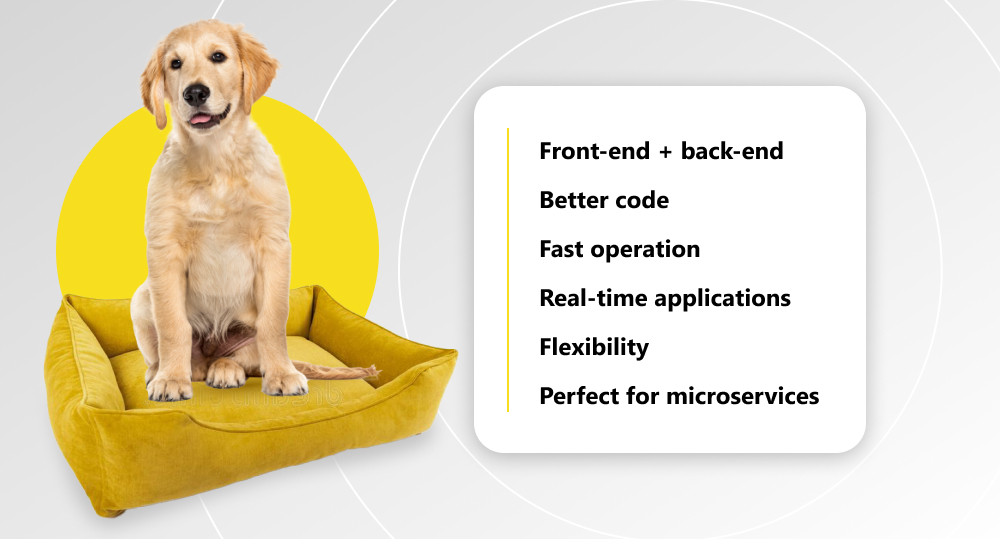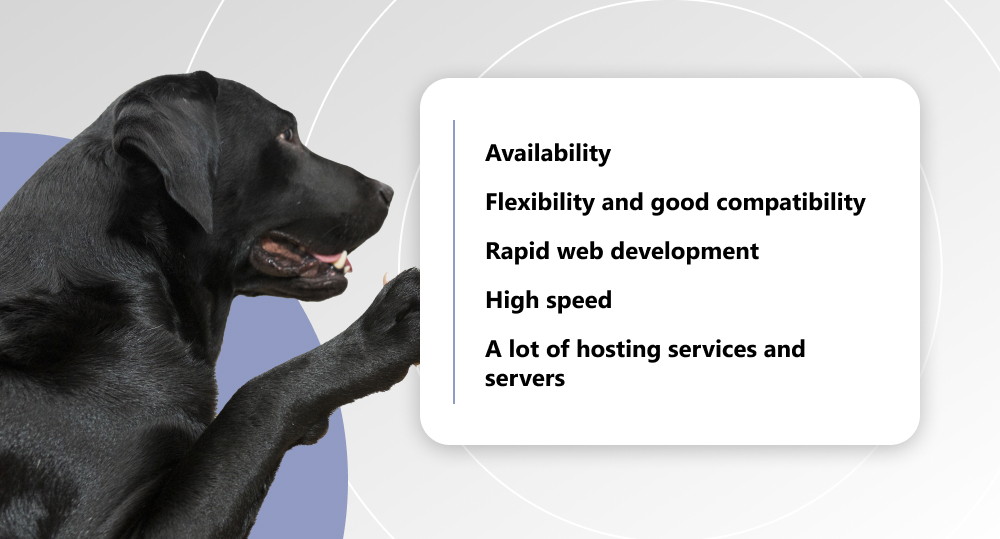JavaScript versus PHP: what's the difference between them and what programming language should you choose for your project? Both languages are constantly taking high positions in the rankings of the most in-demand instruments. They are powerful, flexible, and object-oriented languages that are used in many companies.
In this article, we will compare PHP and JavaScript and tell you about their strengths and peculiarities so that you'll be able to make the right decision. Almost 65% of developers prefer JavaScript, while 22% of programmers deal with PHP. What group will join you?
written by:
Pavel Dichkovsky
Senior Software Developer, Qulix Systems
JavaScript versus PHP: what's the difference between them and what programming language should you choose for your project? Both languages are constantly taking high positions in the rankings of the most in-demand instruments. They are powerful, flexible, and object-oriented languages that are used in many companies. In this article, we will compare PHP and JavaScript and tell you about their strengths and peculiarities so that you'll be able to make the right decision. Almost 65% of developers prefer JavaScript, while 22% of programmers deal with PHP. What group will join you?
Contents
Main Difference between PHP and JavaScript
In fact, PHP and JavaScript cannot be compared since they are completely different programming languages. PHP is strictly a server-side scripting language, while JavaScript is mainly used for front-end development. In other words, we can call it a client-side scripting language. But when Node.js, a JavaScript-based framework focused on web development, was put to the table, JavaScript has become a universal language that can be used for both client-side and server-side programming. Therefore, we can safely discuss these languages within the context of backend development.
Welcome Player 1: JavaScript
JavaScript is a high-level, dynamic, interpreted programming language created by Brendan Eich in 1995. It's primarily used in front-end development as it was originally created to add dynamics, interactivity, and animated effects to web pages. Everything you see on most websites, such as the animated content, various sliders, carousels, pop-ups, parallax effects, and many other cool features are implemented by web developers in JavaScript.
The language has other possibilities. For example, programmers use JavaScript to create desktop and mobile applications for various operating systems. The appearance of Node.js allowed developers to use it for server-side programming as well. Additionally, JavaScript can be used to develop native Android and iOS apps with the help of the React Native framework.
Thus, you can see that JavaScript is used almost everywhere: from the creation of dynamic web pages to the development of various apps, games, web servers, and so on. It's truly one of the most popular programming languages today and will continue to gain community support. In October 2021, JavaScript ranked seventh in the TIOBE index, overtaking PHP, Go, Ruby, and Swift. It's a versatile language with a well-developed infrastructure, a large community, and a powerful set of tools that include various libraries (Underscore, Lodash), frameworks (Vue, React), builders (Gulp, Webpack), and so on.
Let's Talk About Node.js
Node.js is a V8-based software platform created by Ryan Dahl in 2009. It allows JavaScript to interact with I/O devices through its API (written in C++). Frontend JavaScript uses Web APIs that provide access to the DOM and user interface of web pages and web applications. Backend JavaScript applies APIs that provide access to the application file system, HTTP requests, and streams. It's one of the most popular technologies among programmers nowadays, according to a recent Stack Overflow Developer Survey 2021. Node.js is used by giants, such as Paypal, LinkedIn, Uber, Yahoo, Medium, GoDaddy, Groupon, Walmart, and others.
Benefits of JavaScript as a server-side language
Front-end and back-end development in the same language
It's a great advantage of JavaScript that turns a frontend developer into a full-stack specialist. JavaScript allows you to hire fewer programmers for your project and avail of the services of one team. They will be able to share knowledge with each other and re-use the code, which will increase their productivity and allow them to launch the product faster.
Better code
The fact that you are using the same language for the backend and frontend parts makes your source code cleaner and more consistent. You can easily send and sync data between server-side and client-side encoding. Using the same tools and practices allows programmers to save development time.
Fast operation
Node.js is a fast platform thanks to the V8 engine that was written in C++ and developed for Chrome. It's needed to compile the functions written in JavaScript into the machine code, and V8 does this job perfectly and quickly. Moreover, Google is constantly improving the engine, which has a positive impact on its efficiency, allowing Node.js to work smoothly.
An ability to build real-time applications
Asynchronous request processing and the event-driven model allow web developers to use JavaScript and Node.js to create real-time applications. The asynchronous method does not block the flow of requests, and the use of the same language for backend and front-end development facilitates fast synchronization. If you are building a product that requires constant data updates (chats, online games, video conferencing, etc.), Node.js is your ideal choice.
Flexibility
Node.js has no strict rules or hard dependencies, which allows programmers to choose any architecture or plan their own structures when creating apps. What's more, the community is permanently developing new instruments and features that allow programmers to make excellent products.
Perfect for building microservices
At the present time, many web developers prefer not to create ready-made applications, but to launch MVP in order to test their idea, get user feedback, and decide on the next steps. For example, you need to update or scale your app, or you want to change the architecture without affecting other parts of the application. In this case, you can split it into microservices to be able to work with them separately. Since Node.js is highly scalable and lightweight, it's great for building microservice architectures. You, in turn, will be able to use the code between the client and server sides several times, which will allow you to reduce development time and cost since you will deal only with new or updated features.
Welcome Player 2: PHP
Like JavaScript, PHP is one of the most widely used programming languages now. But in contrast to JavaScript, PHP is used exclusively for backend development. It is impossible to make desktop and mobile applications in PHP, too. According to some estimates, PHP is used on almost 80% of websites, including services, such as facebook.com, wikipedia.org, wordpress.com, and many others. Its popularity is explained by the simplicity of the language that allows programmers to quickly and easily create websites and portals.
PHP (Hypertext Preprocessor) was created by Danish programmer Rasmus Lerdorf in 1994 and originally represented a set of scripts in Perl, another programming language. Then this set of scripts was rewritten into the C interpreter. From the very beginning, PHP provided a handy set of tools for the simplified creation of websites and web applications.
Advantages of Using PHP
Availability
PHP is an open-source language that allows developers to use it for free. You don't have to buy a license if you want to create your website in this programming language. Due to the fact that a large community has formed around PHP, various tools and functionality will be available to you.
Flexibility and good compatibility
PHP is a universal language that:
- Works great on various operating platforms (Windows, Linux, macOS, etc.)
- Supports a huge number of databases (MySQL, MongoDB, PostgreSQL)
- Interacts with numerous servers (Netscape, Apache, Caudium, Microsoft Internet Information Server, iPlanet, Oreilly Website Pro, Xitami, OmniHTTPd, Personal Web Server)
- Integrates with various programming languages.
If you have any ready-made solutions or infrastructure in PHP, you won't have to spend a lot of time and money on making any changes or additions.
Rapid web development
PHP is known as the fastest programming language compared to others thanks to its object-orientation. Simply put, your web developers can reuse the code, saving you time and budget for developing web applications and websites.
High speed
People don't like slow-loading web pages. If your website takes longer than 3 seconds to load, users will immediately leave it. PHP applications can be easily downloaded in spite of the slow internet connection and data transfer speeds. Other apps spend a lot of time connecting the database and extracting data after making certain queries to the database. PHP does not face this problem and loads the site very easily and quickly.
Availability of a wide range of hosting services and servers
Hosting is a service for providing space on the server to host files and databases of the websites and provide their constant availability on the Internet. So, the website won't work without the hosting service. Since almost all providers support PHP websites, you will always have a wide pool of servers and hosting services.
PHP vs JavaScript: Similarities and Differences
- Both JavaScript and PHP are interpreted scripting languages, i.e. they don't require preliminary compilation to machine code. This allows programmers to change the code and run it again to see the effect without the necessity to recompile it. Once again, it should be noted that JavaScript is a client-side scripting language, while PHP is a server-side scripting language.
- All major operating systems, servers, and databases can work with PHP, while Javascript is supported by all browsers. We can conclude that both languages are platform-independent.
- You can use both languages for free. Please note that PHP is open-source, while JavaScript is an implementation of the ECMAScript language standard, which is an open standard but not open-source. A locale cannot be open-source because it's not a program. It's a document describing the expected software behavior, but it can be implemented. Thus, JavaScript is free to download.
- PHP is considered more secure because its code is not visible in the browser.
- PHP is a multi-threaded and asynchronous programming language, while JavaScript is an asynchronous single-threaded language. This means that PHP can't perform several tasks simultaneously, while JavaScript can do it. Using Ajax (Asynchronous JavaScript and XML) allows web developers to send asynchronous requests.
- PHP is combined with HTML only, while JavaScript is compatible with multiple languages.
- Unlike PHP, JavaScript has no database support.
- JavaScript is faster than PHP (although version 7 solves this problem).
Javascript vs PHP: What Is Your Choice?
So, what is better: PHP or JavaScript? What programming language will you choose for your project that should stand out from your competitors with effective functionality and user-friendly design? Some market participants think that PHP is outdated and has lost its relevance, which is refuted by its popularity and the emergence of new versions and frameworks. Others say that JavaScript is the language of the future. We can argue about this till blue in the face and never come to a consensus.
Each of these languages has certain advantages, so there is no right answer to this question. There is no technology for every task or project. You need to choose the web development technology that will bring you the most benefit. Take into account the aspects of your project, its goals and objectives, and the level of your team if you want to choose the right tool.
If you have any questions regarding the similarities and differences between PHP and JavaScript or can't decide what will suit your project, don't hesitate to ask our specialists. They will help you find a perfect solution. For more detail, please visit our website or get in touch with our support team.

Contacts
Feel free to get in touch with us! Use this contact form for an ASAP response.
Call us at +44 151 528 8015
E-mail us at request@qulix.com










